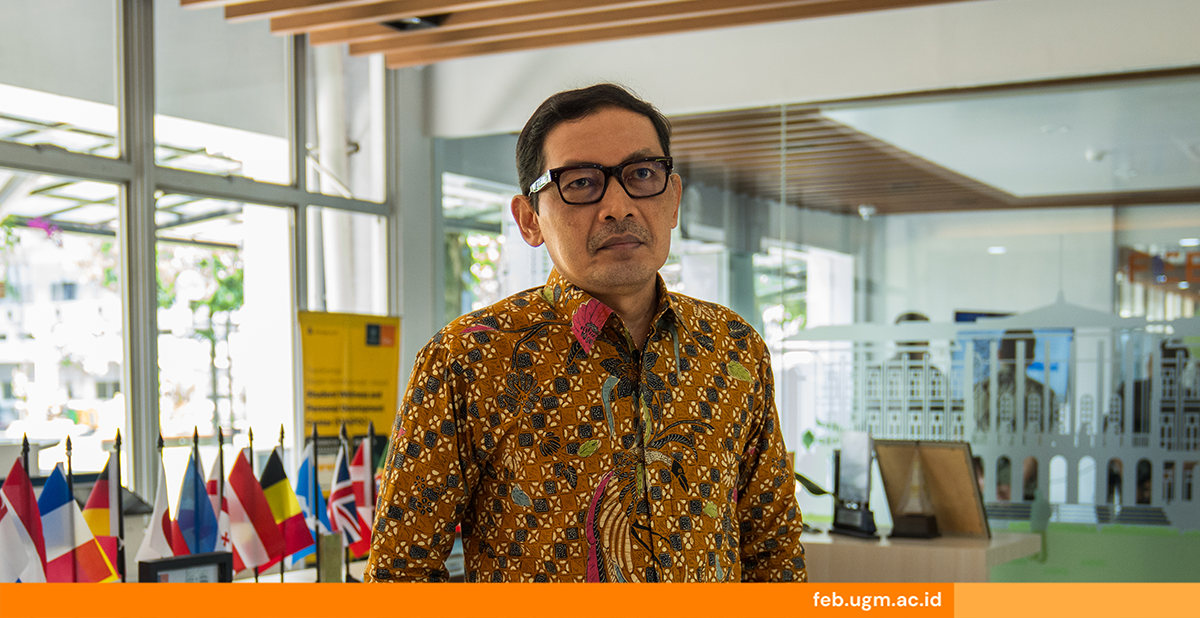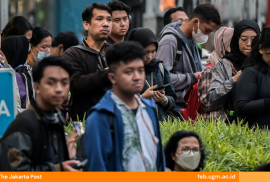
U.S. President Donald Trump has imposed a new import tariff of 32 percent on products from Indonesia. According to Muhammad Edhie Purnawan, Ph.D., an economist from the Faculty of Economics and Business at Universitas Gadjah Mada (FEB UGM), this new import tariff policy could significantly impact the Indonesian economy. With the additional tariff, the total burden on Indonesian products could reach 37 percent. This tariff will dramatically impact exports such as electronics, footwear, and garments, contributing significantly to Indonesia’s trade surplus with the U.S. of $16.84 billion in 2024.
“The impact on Indonesia’s economy will be a decline in exports as Indonesian goods become more expensive and less competitive,” he explained in an interview on Tuesday (April 8, 2025).
The FEB UGM economics lecturer added that labor-intensive sectors such as textiles and footwear would be particularly vulnerable. Moreover, the poverty rate could increase, with a similar impact predicted to what happened in Vietnam during the US-China trade war in 2019.
“A decline in export revenues could also lead to a depreciation of the rupiah, rising inflation, a weakened fiscal balance, and lower tax revenues,” he added.
However, Edhie Purnawan noted that the new import tariffs could also provide opportunities to expand market share for Indonesian apparel and footwear in the U.S., as Indonesia’s tariff rate (32%) is lower compared to Vietnam’s (46%) and Cambodia’s (49%). The tariff policy could also attract investment relocation from countries struck by the tariffs, such as China.
Trump’s Tariff Game: Brinkmanship and Indonesia’s Strategy
Edhie further emphasized that Indonesia must carefully assess the situation and seek global market opportunities amidst significant volatility. From April 2 to 4, 2025, the S&P 500 fell 10.53 percent, the Dow Jones fell 9.26 percent, and the Nasdaq fell 11.44 percent, resulting in losses of approximately US$5-6.6 trillion in the U.S. market. European markets, such as the FTSE 100 and DAX, also fell by 6.43% and 6.40%, respectively, while Asian markets were mixed, with Japan’s Nikkei 225 down 5.44%. This volatility could pressure Indonesia’s economy through falling global demand and rising uncertainty.
Citing the latest issue of The Economist, Edhie said the tariff policy was hurting the global economy and the U.S. economy. American consumers will pay higher prices, and U.S. manufacturers will lose their competitive edge. For example, Nike’s stock has dropped 7 percent because of tariffs on Vietnamese goods.
From an academic perspective, Edhie explained that the U.S. uses these tariffs to change the “payoff matrix” in the bilateral trade game, effectively pushing Indonesia to rethink its export strategy. Indonesia must find a new equilibrium—specifically, a Nash equilibrium—by diversifying its markets and actively engaging in high-level economic diplomacy to maximize gains amid rapid changes.
He explained that although the U.S. aims to generate revenue and strengthen its negotiating position through the tariffs—with minimal inflationary impact if paired with currency adjustments—the tariffs will likely harm Indonesia directly, mainly by causing a significant drop in exports.
U.S. Tariff Chaos: Diplomacy, Diversification, and Winning Without War
So, what steps should the Indonesian government take in response to this U.S. policy? Edhie Purnawan suggests that Indonesia’s optimal response would be a mixed economic diplomacy strategy, market diversification, and domestic support. Indonesia could pursue a diplomatic path to avoid retaliation by reviving the Trade and Investment Framework Agreement (TIFA) to address trade barriers. Deregulating non-tariff measures (NTMs), such as relaxing local content requirements for U.S. ICT firms (GE, Apple, Oracle, Microsoft), and offering fiscal incentives such as reduced import duties, income tax, and value-added tax, could attract U.S. firms.
Another approach is to diversify export markets to ASEAN, Europe, and the Middle East and join trade blocs such as CPTPP or BRICS to reduce dependence on the U.S., which is consistent with the exit option strategy in game theory. Working with Malaysia as ASEAN chair in 2025 to develop a collective response to global trade challenges would be a promising multilateral approach. Supporting affected industries through tax incentives, retraining programs, and fiscal stimulus to boost domestic consumption is also key to stabilizing the economy.
With global markets in turmoil, Edhie stressed that Indonesia needs to coordinate with other countries, especially within ASEAN, for a collective response and explore alternative economic partnerships given the decline in global indices such as the FTSE 100 and Nikkei 225. Countries should increase trade among themselves, especially in services – an area of importance for Indonesia to reduce its dependence on goods exports to the U.S. Indonesia could take advantage of this moment by strengthening its digital and services sectors, which are less affected by U.S. tariffs, and seeking new trade agreements such as the CPTPP to expand market access.
“From a game theory perspective, this is a repeated game in which Indonesia must choose a mixed strategy of cooperation (economic diplomacy) and competition (diversification). Negotiation can help achieve a more favorable equilibrium, while diversification is a minimax strategy to reduce risk if talks reach an impasse,” he explained.
Similarly, suppose the U.S. uses tariffs as a starting move in a “Tariff Chaos” game to gain leverage, followed by reciprocal tariffs and a “Mar-a-Lago Accord” for currency adjustment. In this case, Edhie urges the Indonesian government to prepare thoroughly, mainly through Bank Indonesia. The government aims to manage currency volatility and explore ways to align mutual interests with the U.S.—such as securing cooperation in raw material supply or investment—in exchange for tariff concessions and broader economic protection.
Calm Does Not Mean Inaction
In mounting pressure, the Indonesian government appears to be reacting calmly to these policies. In response, Edhie Purnawan argued that the government’s calm demeanor is not a sign of weakness but a mature strategy. When the president appears calm amid geopolitical turbulence, it is not passivity but a calculated move to keep Indonesia’s position unpredictable for its opponents.
“Given the huge disparity in economic power – the U.S. is at the top of the global pyramid with a GDP of $27.7 trillion, while Indonesia is at $1.4 trillion (2023) – any move that’s too quick could trap us in a game we’re bound to lose. Therefore, composure is a form of resistance: refusing to be provoked into a confrontation designed by the opponent,” he explained.
Beyond diplomatic calculations, this strategy also reflects macro-structural caution. Trump, an anti-orthodox actor unwilling to negotiate unless baited with big offers, cannot be approached conventionally. Indonesia must build resilience from within, preparing for potential supply chain disruptions, reduced export orders, and pressure on labor-intensive sectors.
What may seem like a sluggish policy creates strategic space. It allows Indonesia to strengthen domestic sectors, shift its export market orientation, refine non-tariff technical regulations, and build alternative regional partnerships. As global markets face turmoil—with the FTSE 100 and Nikkei 225 falling and volatility increasing—Indonesia must actively avoid falling into an unproductive cycle of retaliation.
Strong and Transparent Communication
Edhie Purnawan recommends that the government adopt a signaling framework with incomplete information in a game to maintain public confidence and reassure financial sector stakeholders. Open communication and sharing of plans, such as active diplomacy on TIFA, NTM deregulation, and increased imports from the U.S., are necessary to demonstrate control of the situation.
In addition, the rapid identification of opportunities, such as apparel and footwear market share growth and potential investment relocation, is critical. A policy of currency stabilization using foreign exchange earnings (DHE), which addresses USTR’s criticism of rigidity in retention, signals Indonesia’s flexibility and strength. Coordination with ASEAN and other major economies for collective action can reduce isolation pressures. At the same time, data-driven demonstrations- such as Indonesia’s relatively low (0-5%) tariffs on the U.S.- are essential to assert fairness.
“In the context of a volatile global market, the government must also explain how Indonesia is preparing to face external challenges, including fluctuations in indices such as the S&P 500 and Dow Jones,” he concluded.
Reported by: Kurnia Ekaptiningrum
Sustainable Development Goals










